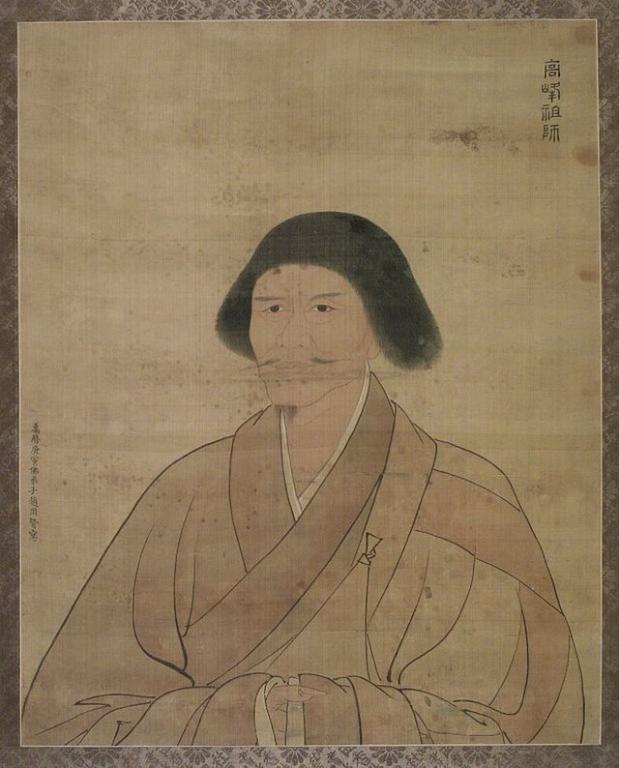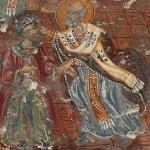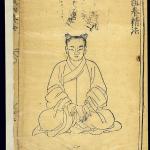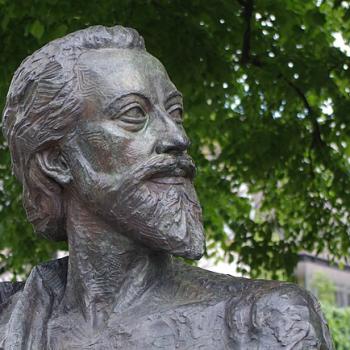
portrait by Zhao Yongxian (c 1590)
Brooklyn Museum
“The ancients spoke of three essential conditions for Zen practice: First: Great faith; second: great doubt; third: great determination. These are like the three legs of a tripod.”
Koun Yamada[1]
Preliminary notes for a larger meditation
When I first started Zen practice in the late 1960s there weren’t a lot of books about Zen readily available. Alan Watts’s wildly popular Way of Zen was published in 1957. It made the somewhat more abstract work of the scholar D. T. Suzuki accessible, if at the same time suggesting a version of Zen that didn’t really touch on practice. But for me, fortunately, by my time there was also Philip Kapleau’s collected and published lectures and essays on the actual disciplines of Zen. Three Pillars of Zen was published in 1965.
Perhaps most remembered today for its collection of contemporary awakening experiences, it was also the first book I found that actually addressed both the why of Zen and, critically, the how to pursue it. In the lecture by Hakuun Yasutani, “The Three Essentials of Zen Practice,” I was introduced to the heart of that practical path toward awakening which is Zen’s great gift toward our intimate nondual awakening.
When one enters the way, after learning the rudiments of Zen meditation, whether sitting, perhaps involving the breath, perhaps not, walking, retreats, or through liturgy, any of the several disciplines, the beginner is invited with this into a personal consideration of life and death and who we really are.
It is with this that we are invited into this consideration following three strands, faith, doubt, and energy.
Yasutani Roshi points out that “Buddhism has often been described as both a rational religion and a religion of wisdom. But a religion it is, and what makes it one is this element of faith, without which it is merely philosophy.”[2] True. And it’s more complicated, I’ll return to this. The second, and perhaps the most unique aspect of Zen against pretty much all the religious traditions of the world, is doubt. Doubt as the great engine of practice. It’s more complicated, and I will return to this. And third is great energy. Persistence or determination. It’s also more complicated, and I will return to this.
Paying attention to these three things we find the method of Zen.
These necessary elements were first put together systematically by the thirteenth century Chinese master Gaofeng Yuanmiao.
First is faith.
Faith as one description of this state is as if one is “leaning against Mt Sumeru.” Sumeru is the sacred mountain at the center of things. As I take it, it means a confidence experienced when one physically touches a mountain with one’s own hands and feet, feeling the incline, noticing the dirt and plants.
It’s the body knowing of direct encounter. This is a letting go of the clouds of our minds and experiencing who we, you, and I are on the other side of our stories about ourselves and our separations. I find a corollary in this in the Japanese term shinjin. 信心, as clarity, perhaps as a clarified heart-mind. It’s as if the clouds that normally obscure our experience of the world have parted and we see things the way they are.
And, the truth is, I don’t have that kind of confidence. Faith doesn’t come naturally to me. I tend to see calls to faith, calls to blind faith. That is a statement is delivered from on high, and I’m expected to submit. Not in my nature.
I’m too much a child of the Enlightenment, the Enlightenment of the West, naturalistic, materialistic. If it claims to be a thing, it is subject to testing, measurement, and its claims are subject to falsification. That is, for me, doubt is a very real, and constant thing.
But this faith is different. It’s more a feedback loop of confidence in my own experience. Guided along by the tradition I take what native intuition I have about the fundamental matter, encounter it, deepen what it is I’ve experienced, and proceed on, a sort of cycling down into depth.
Traditionally throughout the world’s religions doubt is a problem to be overcome. And in Buddhism this is no different. In the Theravada, for instance, doubt is considered one of the five hindrances to fully following the way. So, when I saw that doubt itself is considered a strand leading to awakening, at least that was the claim of the Zen way, I found something I could lean into.
Next is doubt.
Doubt I get. There’s so much to doubt. The news. Politicians. People. What I think. I look honestly and I see very little I think that I feel should be axiomatic. It all seems subject to change, nothing I seem to own stands completely up to honest examination. Honest of course is the nut of that problem. It’s the easiest thing in the world to lie to ourselves.
So, how does this become a spiritual practice, or the juice firing my spiritual practices?
Yuanmiao says of doubt, that it’s a “great indecision-and-apprehension.” That it is like one has done something in secret, something shameful, perhaps a crime, and you know you’re about to be exposed. Anxiety, a profound dis-ease. It is the existential dread that touches our hearts and sours everything. But now, here on the Zen way, it is also a path into the fundamental matter of who we are.
Faith can be seen as the intuition that everything is right, what might be called the original blessing, the intimation that we are all more intimate than our words allow us to think. Doubt can be seen as the knowing that we are, as we are, mortal, subject to every failing, and in some very real way our sense of who in all our failings is a curtain shading our joys.
One can see how they complement each other, faith and doubt. Faith, or what we find in the exploration of that mountain at the center of the cosmos is as close to the essential as we’re going to find. Although this “essence” in fact is the lack of any abiding substance, it is the pure interaction of all the elements of the universe in constant play, rising and falling, as one thing, as, in Buddhism it is sometimes said, as no thing. While doubt is the knowing of our very ordinariness, our fragility, our hesitations. They arise as a dynamic in our hearts. As our hearts.
They are, as natural as they are, the stuff of our awakening. Taken together things can emerge, can be uncovered, can be experienced. Together they can synergize, and in a sense become one thing. Now faith, now doubt.
Now one thing.
Two threads winding and carrying us forward.
Allowing us to trace along the vermilion thread into mystery.
And so great energy. The third thread.
Energy, or “great passionate intention, or “determination of great fury.” Energy is easy to comprehend, dedication, purposeful engagement. Wrath is a more interesting translation, evocative of levels of engagement. It’s a kind of dynamism. As Yuanmiao tells us, it’s as if you’ve found the person who murdered your father. The feelings that envelope you perhaps wanting to strike him down with a sword wielded with all the force in your being.
Like with doubt being treated by image of guilt, I find this thirteenth century illumination of energy as wanting revenge helpful.
In our time and place we have an inclination to smooth things over. In general I think this is salutary, politeness is the lubricant of society, and decency and good order are worthy in their own rights. But here we are moving into the most desperate of things. Fired by our knowledge something is wrong, we are embarked on a path. One that calls forth everything.
After all life and death are the matter here.
And so…
The three strands of the golden thread of Zen practice.
[1] Koun Yamada, Zen: the Authentic Gate, Wisdom Publications, Somerville, 2015. p. 193
[2] Philip Kapleau, editor, Three Pillars of Zen: Teaching, Practice, and Enlightenment, Doubleday Anchor, 1989, 2000. New York. p. 87














